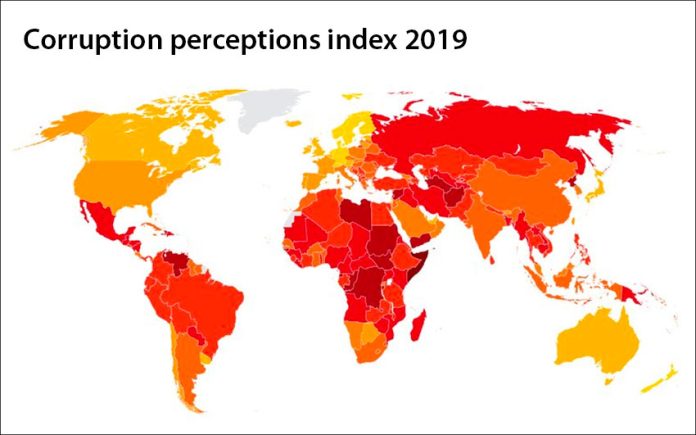Corruption is less of a problem in Mexico today than it was a year ago, according to the organization Transparency International.
Mexico rose eight places on the Corruption Perceptions Index (CPI) 2019 to rank 130th out of 180 countries, sharing its position with Guinea, Laos, the Maldives, Mali, Myanmar and Togo.
Mexico’s score on the CPI scale in which 100 is very clean and 0 is highly corrupt improved one point to 29 but is still well short of the global and Americas average, which was 43 in both cases.
Still, the higher ranking is welcome news after Mexico plummeted 33 places during the six-year term of former president Enrique Peña Nieto.
Eduardo Bohórquez, executive director of the Mexican chapter of Transparency International, said the change of government in December 2018, the creation of a legally autonomous federal Attorney General’s Office and the progress made in the implementation of the National Anti-Corruption System all contributed to Mexico’s improved score and resulting rise in the rankings.
However, the main factor was the anti-corruption work of the government’s Financial Intelligence Unit (UIF), he said.
Headed by Santiago Nieto, the UIF has taken a leading role in the fight against corruption initiated by the administration of President López Obrador, including investigations into high-profile figures of the former government such as ex-cabinet secretary Rosario Robles and former Pemex chief Emilio Lozoya.
Celebrating the improvement in the rankings on Thursday, Public Administration Secretary Irma Sandoval declared that the federal government is combating corruption in a “structural way.”
She said the scourge reached an “inflection point” in the first year of López Obrador’s rule and predicted that Mexico’s CPI ranking will continue to rise.
Sandoval noted that Transparency International only considered anti-corruption measures implemented by the government up until August and therefore didn’t take into account “public policies of great importance in our country such as the Republican Austerity Law that incorporates Transparency International recommendations.”
Later Thursday, Security Secretary Alfonso Durazo also made reference to Mexico’s improved standing.
“Today we recovered eight places and due to the great commitment of President López Obrador, we’re sure that we’ll continue to make progress . . . until we’ve regained a country and a government that has completely done away with corruption,” he said.
There is certainly a lot of room for improvement: Mexico was the lowest ranked among the 36 OECD countries and lagged 58 points behind Denmark and New Zealand, which both ranked first with 87 points. Finland ranked third followed by Singapore, Sweden and Switzerland, which shared fourth place.
In the Americas, Mexico ranked below the majority of the 32 countries assessed including Canada (12th), Uruguay (21st), the United States (23rd), Chile (26th), Costa Rica (44th), Ecuador (93rd), Brazil (106th) and El Salvador (113th).
The lowest ranked country in the Americas was Venezuela (173rd), while Somalia ranked dead last ahead of South Sudan, Syria and Yemen.
Source: Milenio (sp), El Universal (sp)
